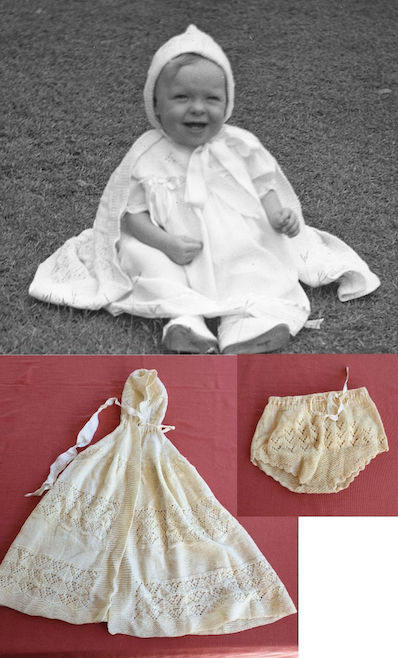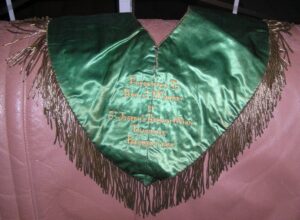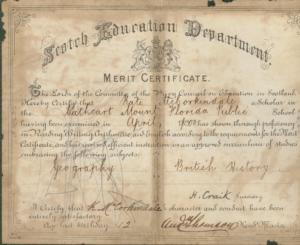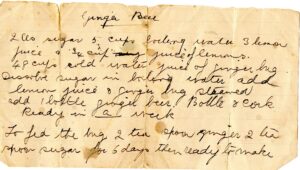How do you decide?
By Pauleen Cass.
How do you decide?

This cute photo is why I wonder what to do with the cape. I think it will go to Lifeline. The woollen knickers will, sadly, go in the bin.
Over the past few years, I’ve been confronted by the same choices many of us are having to make, or have made, in relation to our family’s belongings and indeed our own, if we’re downsizing.
Being family history researchers is a wonderful calling, but at times like this it can also be a curse of sorts. How do we decide what we should keep as part of the family archive, what needs to be recycled, and what can be culled entirely? Even when an item is worn and tattered, if we know the story or the memory behind it, we feel conflicted about throwing it out. Mostly at this point my decision is to take a photograph, document the story behind it if I remember it, and then dispose of the item. And yet, still it pulls at my conscience to consign such formerly-precious belongings to the wheelie bin.
Keep all special thoughts and memories for lifetimes to come. Share these keepsakes with others to inspire hope and build from the past, which can bridge to the future. Mattie Stepanek, author.
The reality is that we don’t live in grand landed estates or castles with multiple rooms and spaces to store an unending supply of memorabilia. In Australia, we may have a backyard shed, but most of us don’t have attics or basements. Even the quintessential Queensland home with its “under the house” space, has a finite limit, not to mention the potential damage from water or dust, dirt and bugs.
Also, as we move through the generations, we have generally become more affluent. Our great-grandparents would mostly have had limited belongings to leave behind, if their wills are any indication – and do you find yourself wondering what happened to some of those things mentioned? As we move through the generations, most of us have our own collection of “stuff”, some precious though most of it not valuable in any financial sense, however they evoke memories for us individually.
Will our children want any or nothing of our belongings? Should we be clearly telling them in advance what we’d really like them to treasure into the future if possible? And if we don’t have immediate family, what then? Who do we pass these on to? Do we wait until we leave this mortal coil or do we pick an age when we’re willing to forfeit them from our lives – perhaps on a niece or cousin’s special birthday?

One of my grandfather’s Hibernian sashes – a keeper.
Current décor styles tend to reject dark heavy furniture thus discounting the appeal of inheriting larger items which often won’t even fit into modern houses or units. While we were grateful to inherit some of my grandparents’ furniture in our early married years, all these decades later I sometimes long to just dispense with it and choose my own style. All I wanted for years was the gramophone that my grandmother used to foster my love of bagpipes. I have it now but finding it an appropriate home within the home isn’t easy. So much for downsizing!

My grandmother’s Scottish Merit Certificate…some little demon scribbled in it.
One type of thing it’s worth giving thought to is the handiwork of our maternal ancestors. As we know, so often the women in our family are hidden from the public record. Their craft work, memorabilia and recipe books can give us insights into them as individuals. Curating a sample of these to keep across the generations is probably a worthy family history activity. So have a close look at the doilies, embroidered tablecloths, baby books, address books, diaries (we wish!) and other collections that may come your way.
It’s probably fair to suspect that most family historians won’t be doing a Marie Kondo on their homes, but surely there’s some balance to be found.
Do we reach a decision on when to part with a lot of our stuff, or leave the myriad items to our families to curate or dispose? 1800 Skip anyone?
Have you made specific bequests to family in your will and consulted them in advance?

My grandmother’s Ginger Beer recipe in her own writing.
Most importantly, have you made specific decisions about what happens to your decades of family history research? It may come down to which “child” has the highest tolerance for “stuff” and is most likely to preserve it.
Alternatively, you could write up as much as you possibly can, incorporating your key research documents even as attachments (and remembering copyright considerations). But that’s a topic for my next GSQ blog post.
The best book I’ve found to help me on this genealogical downsizing exercise is Downsizing with Family History in Mind by Devon Noel Lee and Andrew Lee.
It would be interesting to learn how readers have resolved these questions for their own inheritances. Please share your views or experiences in the comments.

Pauleen, your blog will certainly hit the spot with many of us. I find it really hard to dispose of anything I have that has a special memory attached to it. Some items don’t tug at the heartstrings as much as others, so they are easier to ‘let go’. Your mum was a beautiful knitter and hopefully the cape is something you’ll be able to preserve; thankfully paper mementos are somewhat easier to archive correctly. Lots of decisions loom for us all.
I hear you, Pauleen, but sit in my sizeable study surrounded by shelves, cartons and bags of treasures – I need serious help. As both you and Alex Daw have recommended Devon and Andrew’s book this week I will invest in a digital copy.
BTW We sent all our precious grandparents’ brown furniture off to auction and replaced it with white IKEA and Freedom Furniture – it was difficult at the time but so liberating and more appropriate for a smaller home.
This is such a difficult problem. I have items from my great grandmother that nobody in the family would want. Starting to think of what i should do with them to ensure they do t get thrown in the bin. Now that the paperwork has all been digitised I’m ready to give it all away to societies etc
Hello the lovely Pauleen – oh yes, this is an agonizing topic indeed for many of us. Just yesterday I tipped out onto the matrimonial bed all the baby clothes that we have kept over the years – mine and the children’s. Stuff my mother had made for me and that I had made for the kids. Some items were soiled or mildewed – very sad. Our climate does not help here in Queensland. I think I am going to have to chuck a heap of stuff but some I will record for posterity.
Oh gosh Alex, that’s so hard when you have your own baby clothes as well. All mine and my kids got passed down to cousins (mine were mostly from cousins when I got them). Yes, that’s a great idea to record even those you decide to dispose of. Bobbie
I’m a newby on GSQ Blogs so have been looking back at what others have written and their writing styles. Having researched my ancestors since the early 1980s after doing an evening course by GSQ at The Gap State School, I have also wondered what might become of my research and various items that are dear to me. I will seek out the Lees’ book that you recommend for ideas. My current thoughts are to label those family items that are dear to me with a brief story of why they are so dear. I can reinforce that by pointing these things out to my sons and their families when they visit.